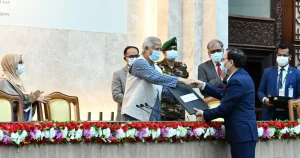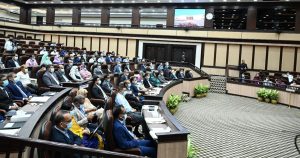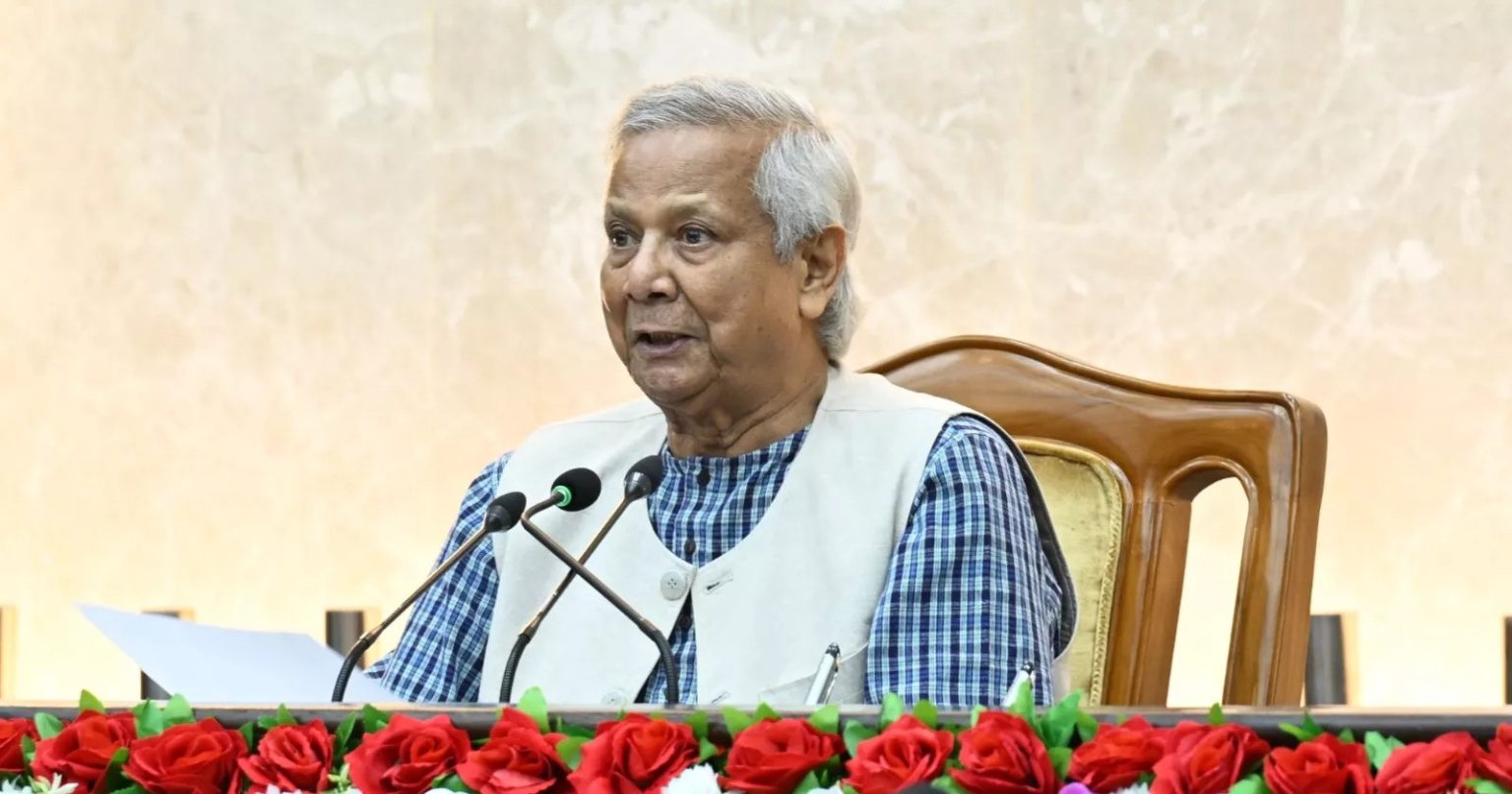Chief Adviser Professor Mohammad Yunus on Wednesday underscored the need for developing a resilient generation, stressing that effective human resource management is vital for ensuring both individual wellbeing and the nation’s sustainable progress.
“We have all come together today to address a critically important issue in the health sector. For national development and progress, skilled and efficient human resources are essential. Without proper human resource management, neither individual wellbeing nor national advancement can be achieved,” he said.
The chief adviser made the remarks on Wednesday while speaking at the signing ceremony of the ‘Joint Declaration’ aimed at strengthening inter-ministerial cooperation for integrated action in the prevention and control of non-communicable diseases (NCDs).
The event was held at the Shapla Hall of the Chief Adviser’s Office in Dhaka.
Prof Yunus said that non-communicable diseases (NCDs) are steadily increasing across almost all countries, with the situation in Bangladesh being particularly critical due to its socio-economic challenges, dense population and limited geographical space.
“As such, NCDs have become perhaps the most pressing issue in national health management,” said CA Yunus. Their impact extends beyond the health sector, affecting our overall economy, social security, and sustainable development,” he said.
Citing the World Health Organisation’s 2022 report, he highlighted that 71 per cent of all deaths in Bangladesh are caused by non-communicable diseases. Alarmingly, 51 per cent of these deaths occur in individuals under the age of 70, which is considered premature.
Besides, 69 per cent of all personal health spending in Bangladesh comes directly out of pocket, with the majority of that expenditure linked to NCDs.
“When someone is diagnosed with cancer, families often exhaust their financial resources and, in many cases, become helpless. Sometimes, seeking treatment abroad becomes the only option—at enormous cost. A substantial amount of our national wealth is drained each year to cover these expenses abroad,” Prof Yunus said.

He emphasised that improving treatment services for NCDs is crucial, but not enough. “Equally important are public awareness, prevention, and early control strategies to reduce the incidence of these diseases.”
Prof Yunus said addressing NCDs is not the responsibility of the Health Services Division alone, as this requires coordinated efforts from all ministries.
Sectors such as food, agriculture, education, sports, local government and public works each have a vital role to play, and specific action plans have already been outlined for each ministry as part of a broader strategy, he added.
Prof Yunus underscored the need for intensive, cross-sectoral initiatives and highlighted the importance of fully implementing the ‘Joint Declaration’.
Priorities for NCD Prevention and Control
“We must focus on critical areas if we are to see real progress,” Prof Yunus said, urging all sectors to transform health awareness into practical lifestyle changes and policy action.
While awareness of public health issues may be increasing, it is not always reflected in behavior, leading to serious physical and mental health problems and a negative impact on socio-economic development, he said.
The chief adviser cited the example of young people facing a dual burden of malnutrition and obesity, and warned that inaction on tobacco control among youth could endanger the next generation.
Raising awareness about sugar intake and other key health risks is important, he said, adding, “Our national policies must be health-friendly and support the prevention and control of NCDs.”
Prof Yunus emphasised special attention to child, adolescent, and women’s health and called for active involvement of civil society and youth in awareness campaigns.

“Widespread public awareness and the adoption of health-focused strategies at all levels can be powerful tools in tackling NCDs. We must promote healthy lifestyles and responsible civic behaviour – this needs to become a social movement,” he added.
In addition to government efforts, Prof Yunus called for greater private sector involvement and regional and global technical collaboration in implementing the ‘Joint Declaration’.
The chief adviser encouraged using public-private partnership (PPP) models to accelerate progress and urged the Health Services Division to lead such initiatives in cooperation with signatory ministries.
He also expressed the hope about necessary support from the World Health Organization (WHO).
Emphasising that successful implementation depends on robust monitoring, evaluation, skilled human resources and adequate funding, Prof Yunus drew attention to the need for proper allocation and administrative support.
He urged all concerned to give special priority to the implementation of the ‘Joint Declaration’, ensure the necessary allocation and manpower so that no special limitations or challenges arise in the implementation process.
“The ‘Joint Declaration’ must not remain a symbolic gesture. It represents our renewed commitment to national health security. Through its full implementation, we can make our public health system more dynamic and set a new milestone in our journey towards achieving the Sustainable Development Goals (SDGs),” he said.
Prof Yunus acknowledged WHO’s Bangladesh office for its continued support, especially in the post-August 5 period, and appreciated the organisation for its contributions to the success of the event. He offered special thanks to Dr Thaksaphon Thamarangsi, Regional Director for Programme Management, WHO South-East Asia Region, for his presence and participation.


